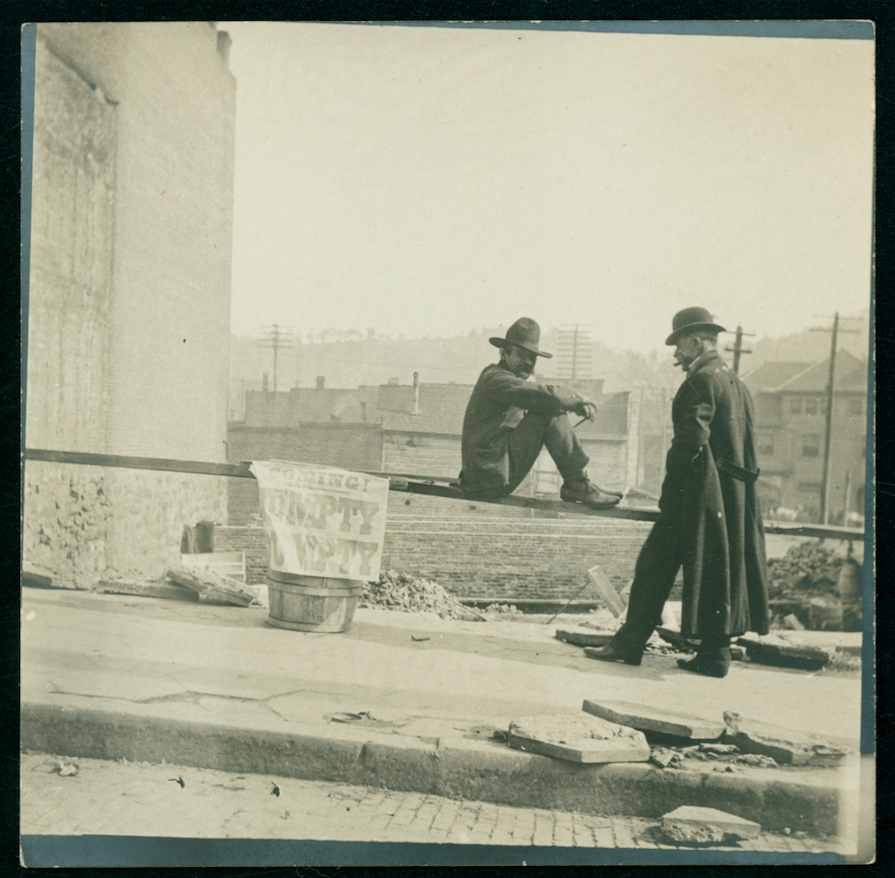On Jan. 8, 1889, the Rev. C.M. Bishop wrote a letter to the editor, published by The Asheville Citizen in the following day’s paper. Speaking on behalf of his congregation, Bishop raised a complaint that echoes to this day. “I wish to call your special attention to a matter, which it seems to us, is of great importance, and which needs a little ventilation; vis: ‘The need for better pavements and sidewalks.’”
Though Bishop’s attention focused primarily on Buxton Street, where his congregation met, he noted, “Even on the principal streets, the pavements are, to say the least of them, no honor to the town.” Many of the thoroughfares, he continued, lacked sidewalks and crossings. These, he declared, “are a positive disgrace.”
Meanwhile, Bishop maintained, the Board of Aldermen continued to ignore his requests and petitions. As a result, members of his congregation were “forced to go through mud ankle-deep” streets.
Though he characterized the aldermen as “high-toned gentlemen and good citizens,” Bishop argued that it was time to vote these leaders out of office in the upcoming May election. The reason was simple, Bishop stated: “They do not nearly meet the demands of the people in this matter of furnishing sidewalks for muddy, almost impassable streets.”
Two days later, Alderman T.C. Westall responded to Bishop’s remarks in a scathing letter to the editor, claiming Bishop fired into the Board of Aldermen “with considerable boldness and recklessness.”
Westall continued:
“I wish to inform the reverend gentleman that the Board cannot do everything without the money. There are six miles of streets, more or less, without sidewalks, all in as bad a fix about mud as the Riverside church street, and the Board would be glad to accommodate all of it could be done: Let Mr. Bishop tell his congregation that all miracles lie nearly two thousand years in the past, and that the present Board cannot work impossibilities.”
Along with decrying Bishop’s declarations, Westall invited the religious leader to run for alderman in the May election. “If he should find that he could not put in good time at his church because of his official duties in trying to lift our streets out of their present ‘disgrace,’” Westall wrote, “I’ll promise to put in a sermon occasionally free for him.”
Not everyone was amused by Westall’s response. On Jan. 19, 1889, one M.B. Ramseur offered his thoughts on the matter, in a letter to the editor. He believed the city would be in far better shape if more community members followed Bishop’s lead.
“Why should it require boldness for the sovereign people to demand of the public servants an account of their stewardship?” Ramseur asked. “Have they, like Caesar, grown so great that we dare not attack them openly?”
Again, Ramseur encouraged residents to speak up, despite the potential consequence of “subjecting ourselves to insolence and abuse” from city officials. “Did more of our citizens, best qualified to direct our public affairs, take an active interest in them, I venture to say, there would be more satisfaction among the tax-payers.”
That May, Westall lost his seat, as the city voted in a new mayor and three new aldermen.
Around the same time, a new business was creating quite a stir in town. C.A. Moody arrived in Asheville in early 1889 by way of Milwaukee. According to The Daily Citizen, he was a manufacturer of artificial stone. “The question ‘how shall we attain good sidewalks?’ may now be on the eve of a satisfactory answer,” the paper declared.
Later that year, on Oct. 10, 1889, The Daily Citizen reported on Moody’s growing enterprise. “We are glad to see this material coming gradually into use for sidewalks, several of the new and handsome stores having adopted it as an elegant outdoor finish for their handsome fronts,” the paper read. “We mention the subject not with obligation to Mr. Moody, but with satisfaction that he has made a new and really very important addition to the industries of Asheville.”
Editor’s note: Peculiarities of spelling and punctuation are preserved from the original documents.




Before you comment
The comments section is here to provide a platform for civil dialogue on the issues we face together as a local community. Xpress is committed to offering this platform for all voices, but when the tone of the discussion gets nasty or strays off topic, we believe many people choose not to participate. Xpress editors are determined to moderate comments to ensure a constructive interchange is maintained. All comments judged not to be in keeping with the spirit of civil discourse will be removed and repeat violators will be banned. See here for our terms of service. Thank you for being part of this effort to promote respectful discussion.